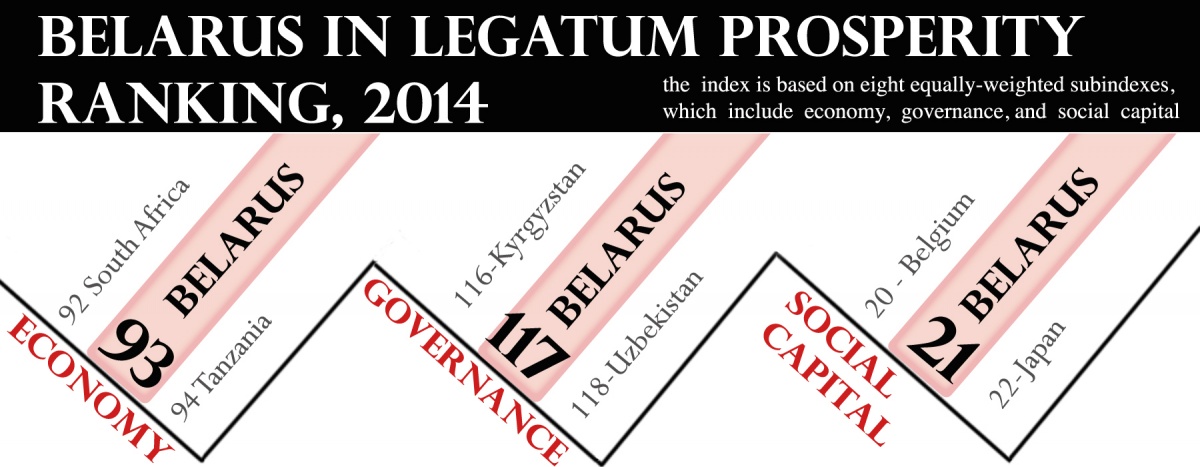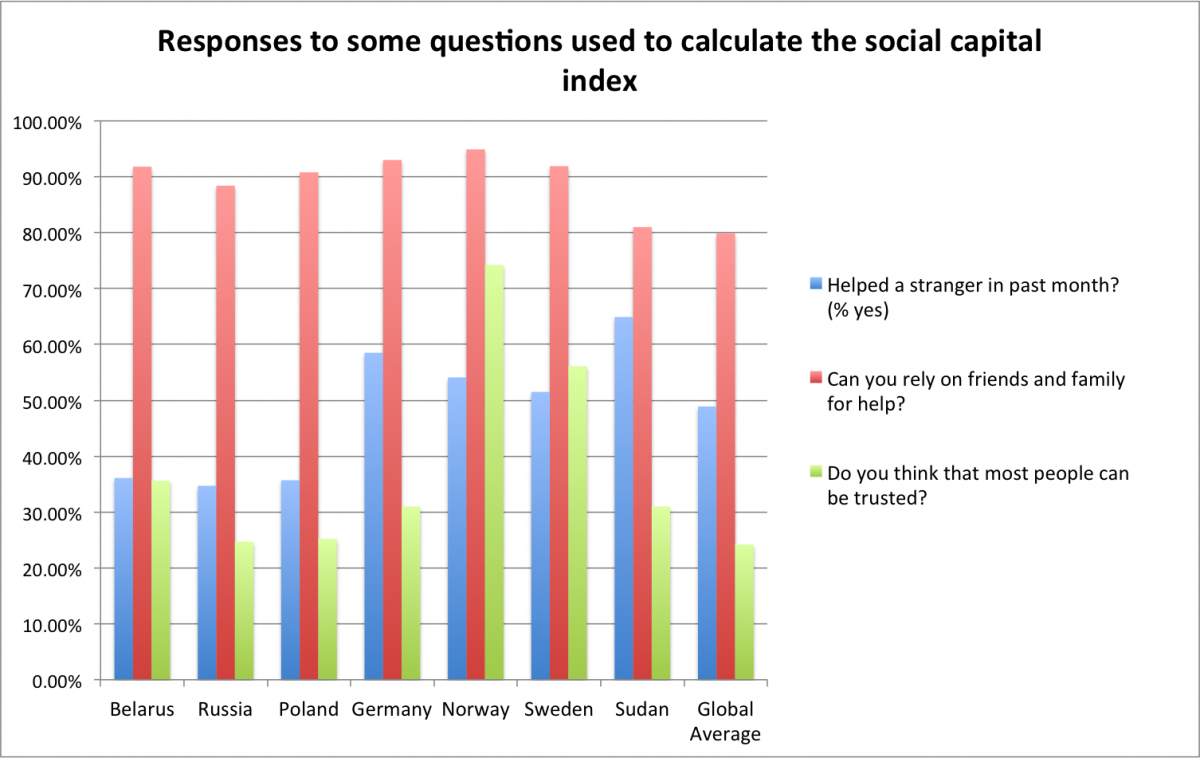Does Belarus Have High Social Capital? Understanding the Legatum Prosperity Index

Belarus ranks 53rd out of 142 countries in prosperity, ahead of Russia and EU member states Greece and Romania. The rankings stem from the Legatum Institute, a private think tank based in London. According to the ranking Belarus scores highest in social capital and lowest in governance.
It is striking for any post-communist state to perform well on measures of prosperity and social capital — let alone Belarus, the country sometimes referred to as Europe’s last dictatorship.
Analysis of this index suggests that personal ties rather than heterogeneous networks permeate Belarusian society. If accurate, this variety of social capital might hamper Belarus’s political and socioeconomic development.
Measuring Prosperity around the Globe
The Legatum Institute defines prosperity as a combination of wealth and wellbeing. It assesses the prosperity of 142 countries based on eight sub-indices, including economy, entrepreneurship and opportunity, governance, education, personal freedom, health, safety and security, and social capital.
In a feat of ambition, the index uses no fewer than eighty-nine variables. At times, however, quantity exceeds quality, making it difficult to interpret the data and draw comparisons between states.
To some extent, the Legatum ranking correlates with other measures of wealth and development. Western democracies rank highest, with Norway the most prosperous of all. Sub-Saharan states, on the other hand, perform poorly and cluster toward the bottom of the rankings. 
Somewhat surprisingly Russia receives the worst prosperity ranking of any European country, based on low scores for governance, personal freedom, and safety and security.
The real curiosity, however, is how the index judges average performers like Belarus. Belarus’s overall prosperity score places it between Mongolia and China. All other post-Soviet states remain far behind.
Nonetheless, the eight sub-indices used to compose the overall index paint a more complex picture of Belarus. On education, Belarus sits between highly developed democratic states such as Austria and Japan, even though it lacks academic freedom and has abstained from all international assessment programmes.
Belarus performs best on the social capital sub-index, where it ranks 21st among 142 countries. On this dimension, Belarus comes right after Belgium, a wealthy democratic state in Western Europe. How can this be, given Belarus's authoritarian record?
One explanation is that Legatum relied on the Gallup World Poll. The sub-indices compare countries based on public opinion, as measured by Gallup in telephone surveys. The same question can be interpreted differently across cultures, and citizens of authoritarian states may lie when asked to critique their government.
Does Belarus Have High Social Capital?
If accurate, a high ranking for social capital is welcome news for Belarus. Social capital – generally defined as the norms and networks that facilitate collective action – can facilitate beneficial outcomes ranging from democratisation to public goods provision to economic growth. A diverse stock of social ties can encourage political participation, decrease corruption, and improve overall governance – the very indicator Belarus performed so poorly on.
Importantly, these positive effects of social connectivity apply only to the so-called "bridging" social capital, based on the diffuse ties between heterogeneous groups of people. They do not apply to "bonding" social capital, or the strong ties between friends, families, and people who are alike. Overreliance on such homogeneous networks can lead to nepotism, unfair distribution of resources, and corruption.
The predominant scholarly opinion has been that Belarus is low on bridging social capital – due to both its socialist past and the authoritarian present.
In the Soviet Union, the Communist Party dominated the public sphere, and participation in all civic activities was mandated and controlled by the state. In present-day Belarus, the lack of independent media and freedom of association continues to hamper the development of heterogeneous social ties.
Under these conditions, only tight networks within families and between close friends can prosper. This seems to be the state of social capital in Belarus today.
Bridging versus Bonding Social Capital
The high levels of social capital observed by the Legatum Institute resulted from a combination of unconventional measurements and a failure to distinguish between family ties and heterogeneous networks.
The index combines Gallup World poll responses on seven unrelated questions, which ask respondents whether they (1) donate money to charity, (2) help strangers, (3) volunteer, (4) trust others, (5) attend a place of worship, (6) live in a marriage, and (7) rely on their family and friends in times of need. While the first four questions more or less speak to the prevalence of bridging social capital, the reliance on friends and family measures bonding ties, while marriage and religion fail to relate to social capital altogether.
Belarus ranks well in the Legatum subindex to a large extent because 91.8% of respondents said they could rely on family and friends for help. In other words, bonding social capital is alive and well in the country. While family and friends certainly improve quality of life, an overreliance on such ties in Belarus is also indicative of low reliance on society at large and the inefficiency of state institutions.
At the same time, Belarus scores below the world average on questions that measure bridging social capital. In particular, only 15% of respondents mentioned donating money to charity; only one-third has helped a stranger or volunteered in the past month; and only one-third believes that people can be trusted. In short, bonding networks dominate while bridging networks are underdeveloped.

Belarus's social capital score is also boosted by the fact that 55.6% of Belarusian respondents are married.
While strong families could possibly produce more civic-minded and altruistic citizens, Belarus also has one of the highest divorce rates in the world, which the Legatum ranking omits. Moreover, marriage rates may have more to do with social mores than with social capital.
Dysfunctional Social Capital in Belarus?
What the social capital questions used in the sub-index suggest is that personal ties and self-interest predominate in Belarus. As reciprocity and trust do not extend beyond one’s immediate family and social circle, people cannot work together to solve common problems. Strong family ties can be an asset, but only when combined with involvement in the broader community. Otherwise, they become a liability.
Most of the post-Soviet space abounds in this dysfunctional variety of social capital. Personal connections played a key role in compensating for institutional deficiencies and securing favours in the Soviet Union. This socialist legacy has persisted to this day.
Belarus has in fact retained many features of state socialism: a lack of clear rules, ineffective bureaucracy, corruption, and an arbitrary legal system. The result is excessive reliance on family and friends to game the system.
Though there are few things in Belarus today that money cannot buy, the exchange of personal favours between relatives and friends remains prevalent. A personal connection at the passport office, for example, can get documents processed sooner. A friend working at the hospital can help bypass the official waiting list for a medical procedure. Being related to a public prosecutor can mean lighter sentencing.
In sum, Belarus’s high rates of social capital are deceiving. Bonding ties remain strong and further weaken bridging ties. The potential consequences for Belarus’s political and socioeconomic development are pernicious: nepotism, corruption, and social anomie.





